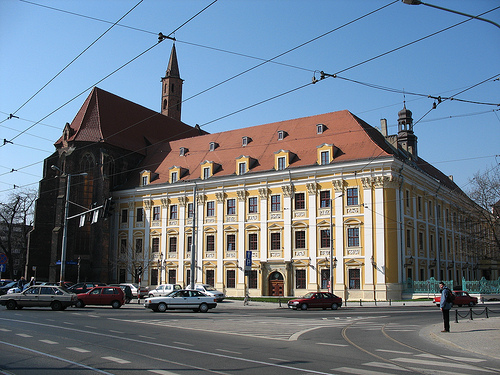Information
Director of the School:
Dr. hab. Anna Żurek
Linguist and glottodidactist. Her research interests include problems in the fields of Polish language and comparative glottodidactics, language acquisition theory, language etiquette, intercultural communication and emprical linguistics. An author of scientific monographs and papers on liguistic politeness, hidden programmes of teaching Polish and German as foreign languages as well as communication strategies of bilingual individuals. A co-author of the textbook for German middle school students ABC Polnish and the collection of on-line exercises for speakers of Polish as an inherited language, entitled Na końcu języka.
Vice-Director of the School:
Mag. Marta Gołębiowska
Polish philologist, language teacher. Examiner of Polish as a foreign language authorized to act as chairman of examination boards in Poland and abroad. The main areas of her interest are the methodology of teaching Polish to people whose first language is East Slavic as well as the problems of linguistic and cultural interference in language education. The author of articles on language education of foreigners and state certification exams in Polish as a foreign language. A co-author of the collection of examination tasks for people preparing for the state exam at the B1 level, entitled Testy na 4 pory roku.
– The School of Polish Language and Culture for Foreigners has been operating since 1974, which means it has over 40 years of experience in teaching Polish as a foreign language. Every year 600-700 people from all over the world take part in our courses and Polish language classes for international students studying in english.
– We offer the following types of courses: semester courses, 2-weeks courses for Erasmus scholarship holders and students of other international exchange programmes, an intensive summer language course, preparatory courses for Polish as a foreign language state examination and the One Year Preparatory course for those who want to start studying in Polish at the University of Wrocław. We also organize courses comissioned by various institutions - e.g. a course for young people from the Leningrad district on behalf of the Marshal Office of the Lower Silesian Voivodeship and a course for students of Mainzer Polonicum (Mainz, Germany).

– The teachers of our School are graduates of Polish studies with a specialization in teaching Polish as a foreign language or postgraduate studies in teaching Polish as a foreign and secondary language, as well as research workers of the Institute of Polish Philology of the Univeristy of Wrocław. The trainers working for the School are well prepared to teach in multicultural and multinational groups, which requires perfect professional background but also good pedagogic skills and experience. They gathered such experience among others while running the course for immigrants "Integration through language tuition INTI". It was organised under the EU project aimed at preparation of a language course model for immigrants common in the whole Europe. Lectures accompanying all our language courses are given both by research workers from the University of Wrocław and by external experts in relevant fields.
– Wrocław is the capital of Dolny Śląsk - a very interesting region both from a cultural point of view and for tourists. Wrocław is frequently called "a meeting place"; it is also said that here the East meets the West. These comparisons lead us to a multicultural history of Wrocław as in its more than a thousand year history it was a Polish, Czech, Austrian, Prussian and German town. Since 1945 it has been Polish again.
– A stay in Wrocław - a University centre with its fascinating history and rich intellectual and artistic life - allows us to observe to what extent its multicultural heritage has been accepted by contemporary habitants and how it has made the city's history more colourful.
– The School of Polish and Culture for Foreigners creates an opportunity for its students to have professional apprenticeship in various cultural and social institutions of the town. Through these activities our participants have an additional opportunity to check their knowledge of Polish in natural circumstances and to gain new experience through observing activities undertaken by various institutions and bodies important for both Wrocław and the whole country.
– In order to do so the participants most frequently work in places like offices for Members of Parliament, offices organising international artistic festivals, various departments of the Municipal Office, Jewish community, museums, University promotion offices and finally the East Europe College. Thus they can be convinced that Wrocław has fully deserved its above mentioned name "meeting place".





